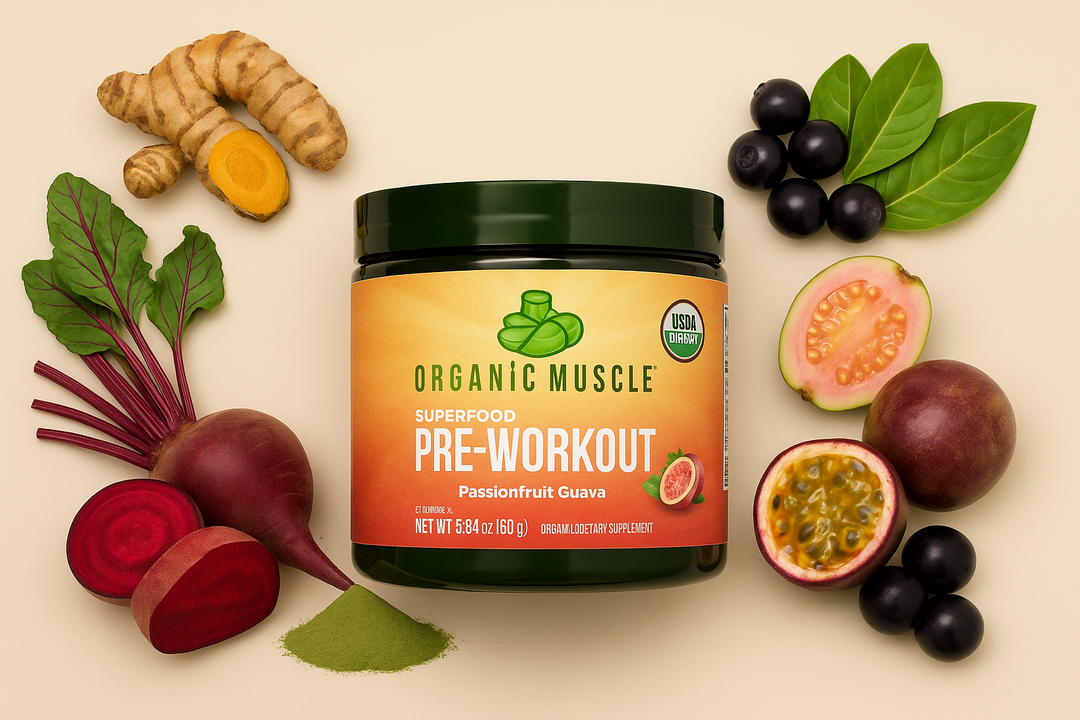Key Takeaways:
- Magical Minerals: Electrolytes play a crucial role in maintaining fluid balance, muscle function, and nerve signaling, thus supporting overall energy levels and performance.
- Efficient Energy: Electrolytes aid in the production and efficient use of ATP (adenosine triphosphate), which is vital for energy generation in your body.
- Brand Matters: Organic Muscle offers certified organic, non-GMO, vegan, and gluten-free electrolyte supplements designed to support your holistic wellness without harmful additives.
At Organic Muscle, we're not just committed to fitness; we're pioneers in revolutionizing your workout experience with all-natural, organic supplements. Our reputation is built on delivering superior, eco-friendly products that not only meet but exceed the expectations of wellness enthusiasts everywhere. Organic Muscle is trusted by committed health and wellness enthusiasts who want quality products that deliver results.
Electrolytes are essential minerals that play a critical role in maintaining the body's hydration and muscle function. They can help regulate nerve and muscle function, balance blood acidity and pressure, and rebuild damaged tissues. However, there's often confusion about whether electrolytes can actually give you energy.
With the endless options for energy drinks and supplements on the market, understanding the true impact of electrolytes on your energy levels is essential for making informed choices about your health and fitness regimen.
In this piece, we will be discussing the role of electrolytes in energy production, how they support your body's functions, and whether they can truly boost your energy levels. Join us as we dive into the science behind electrolytes and uncover their energy-boosting potential.
What Are Electrolytes And Why Are They Important?
Electrolytes are more than just a buzzword thrown around in the fitness community; they are essential minerals with a big job. Found in your blood, sweat, and urine, these electrically charged particles include sodium, potassium, calcium, magnesium, chloride, phosphate, and bicarbonate. They play a crucial role in maintaining the body's balance of fluids, ensuring that your cells and organs function optimally.
But why are electrolytes so important, especially for health and fitness enthusiasts? For starters, they help regulate nerve and muscle function. Imagine trying to complete a workout, but your muscles are cramping, or you're experiencing spasms. Not fun, right? That's your body signaling an electrolyte imbalance. Electrolytes also help to balance blood acidity and pressure, and are crucial for rebuilding damaged tissue. Whether you're an athlete looking to optimize performance, or someone simply looking to maintain a healthy lifestyle, maintaining the right balance of electrolytes is key.
The Science Behind Electrolytes And Energy Production
When we pose the question, "Do electrolytes give you energy?" we're really delving into how these charged particles, which can be found in your favorite Organic Muscle hydration supplements, interact with your body's physiological processes. Electrolytes — such as sodium, potassium, calcium, and magnesium — play a pivotal role in your body's energy dynamics, just not in the direct way a calorie does.
To understand their impact, we must first acknowledge that energy, in the biological sense, largely stems from a molecule called adenosine triphosphate (ATP). Your body produces ATP through various complex processes within your cells, leveraging the calories you consume as raw fuel. Here's where electrolytes come into play.
Electrolytes regulate fluid balance within your cells and throughout your body, ensuring that your muscles, nerves, and organs have the ideal hydration level to function efficiently. When your electrolyte levels are balanced, your cells can carry on their ATP-production endeavors optimally. It’s similar to ensuring your car's engine is well-oiled for a smooth ride.
In the context of muscle function, for instance, calcium enables muscle contraction, magnesium aids in muscle relaxation, and potassium helps to reset the muscle's state, readying it for the next activity. Without the precise orchestration of these electrolytes, your muscles might not perform at their peak, impacting your overall energy availability and expenditure.
Furthermore, electrolytes facilitate the electrical signals that your nerves use to communicate, including signals to the brain and muscles. This communication is critical for executing a wide range of physical activities. Inadequate electrolyte balance can lead to diminished response times and reduced stamina, making your energy reserves feel tapped.
However, it’s crucial to point out that while electrolytes themselves do not contain energy in the form of calories, their regulatory and facilitative roles in the body are essential for optimal energy production and utilization.
The Role Of Electrolytes In Muscle Function And Nerve Transmission
Electrolytes are essential minerals that play a crucial role in muscle function and nerve transmission. While they do not directly provide energy, they are vital for processes that support physical performance and overall health. Here’s how electrolytes contribute to muscle function and nerve transmission:
Maintaining Fluid Balance
- Hydration: Electrolytes, such as sodium, potassium, and chloride, can help maintain the body’s fluid balance, which is essential for proper cellular function.
- Impact on Energy: Proper hydration is critical for maintaining energy levels during physical activity. Dehydration can lead to fatigue and decreased performance.
Muscle Contraction
- Sodium and Potassium: These electrolytes are key to muscle contraction. Sodium enters muscle cells, and potassium exits, creating an electrical gradient that triggers muscle contraction.
- Muscle Performance: Adequate levels of sodium and potassium are necessary for optimal muscle function, helping to prevent cramps and weakness.
Nerve Transmission
- Signal Transmission: Electrolytes facilitate the transmission of nerve impulses by maintaining the electrical potential across cell membranes.
- Coordination: This is crucial for muscle coordination and control, allowing for smooth and efficient movement.
Preventing Muscle Cramps
- Calcium and Magnesium: These electrolytes play a role in muscle relaxation. Calcium is involved in muscle contraction, while magnesium helps muscles relax.
- Balance: An imbalance of these electrolytes can lead to muscle cramps and spasms, affecting performance and comfort during physical activity.
Energy Metabolism
- Enzyme Activation: Electrolytes are involved in activating enzymes that are necessary for energy production within cells.
- Metabolic Support: While electrolytes themselves do not provide energy, they support metabolic processes that convert nutrients into usable energy.
How Electrolytes Help Maintain Hydration And Fluid Balance
Electrolytes and hydration are tightly linked in their role in maintaining energy levels. Here's a breakdown of how they work together:
Electrolytes And Fluid Balance
Imagine your cells are like balloons. Electrolytes act like tiny pumps that control the flow of water in and out of these balloons (cells).
- Sodium: The major player in the extracellular fluid (outside the cells). Sodium helps maintain the volume of fluid outside the cells.
- Potassium: The powerhouse within the cells. It ensures proper fluid balance inside the cells.
When these electrolytes are in balance, water flows freely between compartments, helping your cells function properly.
Dehydration And Electrolyte Imbalance
If you lose fluids through sweating, you also lose electrolytes. This can lead to dehydration and an imbalance in the delicate dance between fluids and electrolytes. Here's what happens:
- Dehydration: When you lose fluids, the volume of fluid outside the cells decreases. This triggers the sodium pumps to try and pull water back in, potentially shrinking cells and impacting their function.
- Electrolyte Imbalance: Losing electrolytes can disrupt the balance between sodium and potassium. This can further hinder the movement of water into the cells.
The Energy Connection
Dehydration and electrolyte imbalance can lead to:
- Muscle Fatigue: When cells are dehydrated, they can't function optimally. This can lead to muscle weakness and fatigue, making it harder to perform activities and leaving you feeling drained.
- Impaired Nerve Transmission: Electrolyte imbalance can disrupt nerve signals, leading to sluggish reactions and decreased cognitive function, which can make you feel less energetic.
Proper hydration and electrolyte balance are critical for ensuring your cells function optimally. This translates to efficient energy production and utilization, keeping you feeling energized throughout the day. Remember, electrolytes themselves don't directly provide energy. They are like the conductors in an orchestra, ensuring everything runs smoothly for the energy production team within your cells.
The Best Sources Of Electrolytes: Food And Supplements
When embarking on a journey toward better health and wellness, understanding the sources of your nutrients is as important as knowing what they do for your body. Electrolytes, which keep the body properly hydrated and ensure that your muscles and neurons function optimally, come from a variety of sources. But what are the best ones?
Natural Foods: Your First Choice
Nothing beats getting your nutrients the way nature intended. For electrolytes, this means feasting on a cornucopia of fruits, vegetables, nuts, and seeds. Here are a few champions:
- Bananas and avocados are your go-to fruits for a quick potassium fix.
- Spinach and kale, leafy greens renowned for their mineral content, are excellent sources of magnesium.
- Nuts and seeds, especially almonds and pumpkin seeds, pack plenty of magnesium and also add selenium to the mix.
- Coconut water stands out as a natural, hydrating drink packed with electrolytes, perfect for post-workout refreshment.
- Dairy products, for those who consume them, are an excellent source of calcium. For the dairy-free crowd, fortified plant-based milks can be a great alternative.
Supplements: The Convenient Boost
In a perfect world, we’d all have the time, access, and resources to consume a perfectly balanced diet. In reality, however, this isn’t always realistic. Here’s where our products come into play. At Organic Muscle, we understand the challenges of maintaining an ideal diet amid the hustle and bustle of daily life. Our range of supplements is here to fill those gaps:
- Electrolyte powders are easy to integrate into your daily routine, ensuring you stay hydrated and charged, whether you're at the gym or on the go.
- Sustainably sourced ingredients mean that while you’re taking care of your body, you’re also taking care of the planet. Each product we offer aligns with our commitment to certified organic, non-GMO, vegan, gluten-free, keto-friendly, and dairy-free standards.
- Free from harmful additives, our electrolyte supplements are clean and efficient. There’s no sucralose, no chemicals, and no hormones — just the good stuff.
Hydration: The Key To Effective Electrolyte Balance
Remember, for electrolytes to work their magic, proper hydration is non-negotiable. Natural sources and quality supplements work best in tandem with adequate water intake. This is not just about drinking when you’re thirsty; it's about maintaining a consistent intake throughout the day to support optimal bodily functions.
Balancing your electrolytes through a combination of nutrient-rich foods and high quality supplements from Organic Muscle can transform your fitness routine and overall health journey.
Choosing The Right Electrolyte-Rich Foods And Drinks
Embarking on a journey to enhance your energy levels through electrolytes shouldn't be a guessing game. With all of the options out there, how do you pick the supplement that will hydrate and energize you without compromising your commitment to health? Remember, it's not just about quenching thirst; it's about fueling your wellness journey with the right choices.
Foods Bursting With Electrolytes
Let's start with the basics: your food. Nature is packed with foods that are brimming with electrolytes. Avocados, for instance, are not just for toast; they're a potassium powerhouse. Spinach, bananas, sweet potatoes, and coconut water are also stars in the electrolyte cosmos, offering a medley of magnesium, potassium, and more. These aren't just foods; they're your natural fuel, perfectly aligned with a commitment to an organic, non-GMO lifestyle.
Drinks That Do More
When it comes to hydration, water is the undefeated champion. But, when your body is yearning for that electrolyte boost, especially post-workout, ordinary water might not cut it. This is where choosing the right electrolyte-enhanced beverages becomes crucial.
Seek out drinks that say "no" to chemicals, hormones, sucralose, and preservatives, echoing the principles of Organic Muscle. Look for electrolyte drinks that are certified organic, vegan, and gluten-free, ensuring that you’re not just hydrating, but doing so in line with a dedication to purity and wellness.
What To Watch Out For
In the world of electrolyte replenishment, not all products are created equal. As fitness and health enthusiasts, the allure of quick fixes like sugary sports drinks can be tempting. However, it's essential to wield your wisdom and opt for choices that align with your health values. Read labels, understand the content, and choose products that are devoid of unwelcome additives. Your body deserves the best, and being discerning means you’re choosing products that truly cater to holistic wellness.
Final Thoughts
The connection between electrolytes and energy levels has multiple layers. While electrolytes themselves do not directly give you energy like calories from food, they play a crucial role in ensuring your body's cells can generate and use energy efficiently. By facilitating vital functions like muscle contractions and nerve signaling, electrolytes help keep your body's energy systems running smoothly.
For fitness and health enthusiasts committed to their wellbeing, integrating a balanced electrolyte management plan into your regimen is key. With Organic Muscle, you're choosing more than just supplements; you're embracing a lifestyle that prioritizes your body's needs in every scoop. Our products are designed with your holistic health in mind, ensuring that you're not just meeting your fitness goals but also nurturing your body with the best that nature has to offer.
So, do electrolytes give you energy? They might not be the direct source, but they are undoubtedly helpful heroes in the quest for optimal energy levels and overall health. Remember, a body well-balanced with electrolytes is an energy-efficient one. Let Organic Muscle help you achieve that balance and unlock your true potential.
Read also:
- How To Replenish Your Electrolytes After A Workout
- Recharge Naturally: Unveiling The Secrets Of Natural Electrolytes
- When To Take Pre-Workout For The Best Results
Frequently Asked Questions About Whether Electrolytes Give You Energy
What are the main electrolytes?
The main electrolytes include sodium, potassium, calcium, magnesium, chloride, phosphate, and bicarbonate. These minerals play crucial roles in your body, regulating everything from hydration to nerve signals and muscle function.
What happens if I have electrolyte imbalance?
An electrolyte imbalance can lead to a variety of symptoms depending on which electrolyte levels are off. You might experience muscle cramps, fatigue, nausea, confusion, irregular heartbeat, and in severe cases, convulsions, and seizures. Proper electrolyte balance is essential for optimal bodily functions.
Do I need electrolytes for every workout?
Not necessarily. For most people, staying hydrated with water is sufficient for typical daily exercise under an hour. However, if you're engaging in prolonged or high-intensity workouts, especially in hot conditions, replenishing electrolytes can be critical to maintain balance and performance.
When should I consider taking electrolytes while exercising?
Consider taking electrolytes if you're exercising intensely for more than an hour, sweating profusely, or working out in hot weather. These conditions can lead to significant electrolyte loss, and replenishing them can help maintain performance and prevent dehydration.
Isn't water enough for hydration and electrolytes?
While water is vital for hydration, it doesn't contain electrolytes. Drinking only water, especially in large amounts, can dilute electrolytes in your body, potentially leading to a condition called hyponatremia. Including electrolytes in your hydration strategy is key, especially during long or intense physical activities.
Can I get dehydrated and have electrolyte imbalance without feeling thirsty?
Yes. Thirst isn't always a reliable indicator of hydration status or electrolyte balance, as you might already be dehydrated by the time you feel thirsty. Listening to your body and regularly consuming fluids and electrolytes during physical activity is essential for preventing dehydration and imbalance.
Can excessive sweating from hot weather deplete my electrolytes?
Yes, excessive sweating, especially in hot weather or during vigorous exercise, can lead to significant loss of electrolytes, particularly sodium and potassium. Replenishing these lost electrolytes is important to aid in preventing dehydration and maintaining bodily functions.
Are there any risks associated with overconsumption of electrolytes?
Yes, just like a deficiency, an excess of electrolytes can also be harmful, leading to conditions such as hypernatremia (high sodium) or hyperkalemia (high potassium), which can affect heart health and kidney function.3 Balance is key, and it's important to consume electrolytes in moderation.
What are the best natural sources of electrolytes?
Many natural foods can provide you with electrolytes. Potassium can be found in bananas, potatoes, and spinach. Magnesium sources include nuts, seeds, and whole grains. For calcium, turn to dairy products or fortified plant milks. Coconut water is a great natural source of several electrolytes, including sodium and potassium.
What are electrolyte supplements?
Electrolyte supplements are products designed to replenish electrolytes more efficiently than regular food or water can. They come in various forms, including powders, tablets, and drinks. Choosing supplements like those from Organic Muscle ensures you're getting electrolytes without unwanted additives, aligning with a holistic approach to health and wellness.
Sources:
- Shirreffs, S. M., & Sawka, M. N. (2011). Fluid and electrolyte needs for training, competition, and recovery. Journal of Sports Sciences, 29(sup1), S39–S46. https://doi.org/10.1080/02640414.2011.614269
- Shrimanker, I., & Bhattarai, S. (2023, July 24). Electrolytes. PubMed; StatPearls Publishing. https://pubmed.ncbi.nlm.nih.gov/31082167/
- Shrimanker, I., & Bhattarai, S. (2023). Electrolytes. Nih.gov; StatPearls Publishing. https://www.ncbi.nlm.nih.gov/books/NBK541123/














